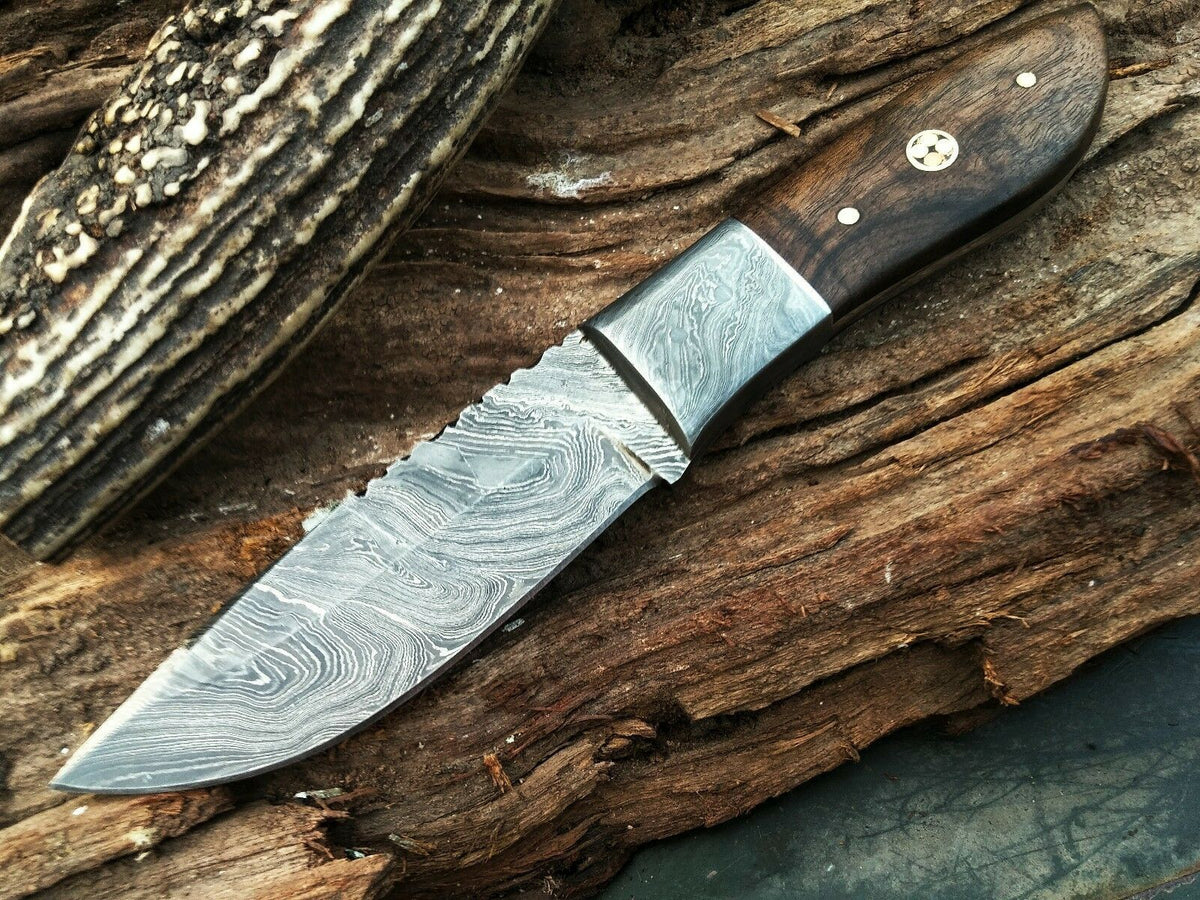I'm considering a belt Knife with a 6" blade in Damascus steel for hunting and general utility purposes. Any opinions or thoughts on Damascus steel is welcome.

Bulldog47
16,786 posts
·
Joined 2019
My buddy has a couple. They are very nice looking. Seem to take and hold an edge well. Only downside I see is they rust quicker if not cared for and real Damascus adds IMHO extra cost for only aesthetics.
I pay extra for nice looking guns, so my extra cost opinion is pretty weak.
I pay extra for nice looking guns, so my extra cost opinion is pretty weak.
3,789 posts
·
Joined 2014
A good Damascus steel will make a fine, tough blade. I always liked their looks.
4,242 posts
·
Joined 2021
Technically, they are all fake.
The original formula for Damascus steel has been lost to history.
The original formula for Damascus steel has been lost to history.
5,190 posts
·
Joined 2010
They are cute, I'll give you that.
For me it would end up joining my few safe queens, so I'll pass.
For me it would end up joining my few safe queens, so I'll pass.
1,586 posts
·
Joined 2020
Some decent info here

 frontierblades.com
frontierblades.com

How to Recognize Real vs. Fake Damascus Steel Knives
Damascus steel knives are considered ideal hunting knives. Damascus knives implement premium materials and perform a variety of tasks. Due to their increased functionality and versatility, Damascus steel knives are a prime target for fake replication. Therefore, how does one determine whether...
 frontierblades.com
frontierblades.com
3,731 posts
·
Joined 2018
I'm becoming a knife steel snob. The specs on steels like S35VN put them high on my list of desirability. I try to avoid non-stainless steel and I think most Damascus knives would fall in that category and do rust; however, they do look nice. I only buy Damascus knives in person so I can see them and decide if the pattern appeals to me. I have a few but they are for display purposes only. Polish them up and oil or wax them and they are good to go. I bought some cheap display stands to put them on. I don't see myself using them other than to look at.
2,589 posts
·
Joined 2022
My son gave me this some time ago.
![Image]()
I have no idea if it's real Damascus or not, and I'm not knowledgeable about such things. I've only used it trim meat in the kitchen so far. It seems to be of excellent quality and holds and takes an edge as well as my time tested hunting knives. And some of those are among the best made.
I have no idea if it's real Damascus or not, and I'm not knowledgeable about such things. I've only used it trim meat in the kitchen so far. It seems to be of excellent quality and holds and takes an edge as well as my time tested hunting knives. And some of those are among the best made.
3,143 posts
·
Joined 2013
My concern would be more about the quality of the Damascus versus if it is fake Damascus.
If you combine 2 crappy steels, fold it a hundred times and grind a beautiful blade it is still a crappy knife ,,,,, that looks cool.
Pakistan, China and several other offshore makers have discovered how to manufacture beautiful pattern welded blades that just will not hold an edge, so beware. As with all cheap imports you get what you pay for.
I have several telltale things I look at to identify a dressed up cheap knife but if all else fails a light file swipe will tell you everything you need to know. It should slide off and feel like a file on glass. If it cuts easy, drop it and run. Too soft to be a real knife.
If a Damascus Knife is $25 to $150 it is most likely low quality. Craftsman made Damascus is expensive. A quality blank piece of nicely patterned Damascus steel can run hundreds.
If you combine 2 crappy steels, fold it a hundred times and grind a beautiful blade it is still a crappy knife ,,,,, that looks cool.
Pakistan, China and several other offshore makers have discovered how to manufacture beautiful pattern welded blades that just will not hold an edge, so beware. As with all cheap imports you get what you pay for.
I have several telltale things I look at to identify a dressed up cheap knife but if all else fails a light file swipe will tell you everything you need to know. It should slide off and feel like a file on glass. If it cuts easy, drop it and run. Too soft to be a real knife.
If a Damascus Knife is $25 to $150 it is most likely low quality. Craftsman made Damascus is expensive. A quality blank piece of nicely patterned Damascus steel can run hundreds.
3,731 posts
·
Joined 2018
Some say the art of making of Wootz steel, early Damascus was lost in the 18th century. I don't know what high quality damascus is but it's supposed to be strong and flexible. It doesn't seem real hard to get 2 or more types of steel and pound them together. Then again true samurai swords are legendary. We may have all heard the stories of samurai swords cutting gun barrels. I think to become a master sword maker you need to apprentice under a master for 5 yrs or so but I hear the art of samurai sword making is also dying.
2,589 posts
·
Joined 2022
I used to know a meat cutter. He told me his old knives kept an edge because the carbon in the blades were either better or there was more of it. I don't know if he was right, but he hung on to those knives with a tight grip, and worked at his trade for a long time.
2 posts
·
Joined 2013
Modern “Damascus” is more correctly “Pattern Welded Steel.” Commonly consists of a carbon steel and a stainless steel. Forge weld, fold and repeat.
“Fake Damascus” is usually made from cheap steel that cannot be hardened enough due to insufficient carbon content. Hence the poor edge retention. It is acid etched to achieve the look of “Damascus/Pattern Welded Steel.”
I would only buy in person, and only if I could talk to the maker so I could ask him about types of steel used, heat treat, tempering, RC hardness, etc.
There are some good makers out there, but there’s a LOT more crap/junk being passed off as “Damascus.”
I, too am a fan of the new Super-Steels designed specifically for knives. Crucible Powdered Metals are outstanding.
JM2cents,
SFH
“Fake Damascus” is usually made from cheap steel that cannot be hardened enough due to insufficient carbon content. Hence the poor edge retention. It is acid etched to achieve the look of “Damascus/Pattern Welded Steel.”
I would only buy in person, and only if I could talk to the maker so I could ask him about types of steel used, heat treat, tempering, RC hardness, etc.
There are some good makers out there, but there’s a LOT more crap/junk being passed off as “Damascus.”
I, too am a fan of the new Super-Steels designed specifically for knives. Crucible Powdered Metals are outstanding.
JM2cents,
SFH
2,370 posts
·
Joined 2013
No Damascus steel is better than modern HSS tool steels. Modern stainless is a better option too.
Why spend the extra money and take a risk for something that offers no benefit nowadays?
Why spend the extra money and take a risk for something that offers no benefit nowadays?
6,954 posts
·
Joined 2012
Real Damascus steel has alternating layers of ferrite/pearlite and cementite with a variety of metal carbides (including vanadium), which makes it hard, tough and hold a sharp edge. There have been some researchers who have reproduced it, but it’s not worth the expense and effort with modern steels able to do as well with less work.
I like the look of modern ”Damascus steel”, but it’s really just pattern welding, as others have already pointed out. It doesn’t have the structure or composition that made real Damascus steel special.
I saw a knife a few years ago that started with a billet of alternating steel and copper that was forged into a beautiful “damascene“ blade. But, it wasn’t any harder, tougher or sharper than a garden variety mass-produced steel blade.
I like the look of modern ”Damascus steel”, but it’s really just pattern welding, as others have already pointed out. It doesn’t have the structure or composition that made real Damascus steel special.
I saw a knife a few years ago that started with a billet of alternating steel and copper that was forged into a beautiful “damascene“ blade. But, it wasn’t any harder, tougher or sharper than a garden variety mass-produced steel blade.
3,143 posts
·
Joined 2013
Yeah,,, that and it was quenched in the blood of a virgin.Real Damascus steel has alternating layers of ferrite/pearlite and cementite with a variety of metal carbides (including vanadium), which makes it hard, tough and hold a sharp edge.
Just can't get that stuff anymore.
Bulldog47
Discussion starter
337 posts
·
Joined 2021
Thanks for all this input, guys. Very shortly I will receive a Damacus blade of the White Hunter style made by a custom knife maker here in the US (Florida, I think) through a longtime friend of mine who is making grip panels from elk antler I supplied. I will let you know how it turns out.
185 posts
·
Joined 2024
I had some posts in here and they are not showing up. What's up with that?
4,242 posts
·
Joined 2021
website has been acting a bit goofy, especially with regards to displaying photos.
9 posts
·
Joined 2019
Damascus can be great, but it depends heavily on who made it and how. For hunting and utility, edge retention and corrosion resistance matter more than the pretty pattern. Cheap Damascus often looks nice but performs no better than budget stainless. I prefer to check this damascus steel knives and i really enjoy to use them.
-
?
-
?
-
?
-
?
-
?
-
?
-
?
-
?
-
?
-
?
-
?
-
?
-
?
-
?
-
?
-
?
-
?
-
?
-
?
-
?
- posts
- 3M
- members
- 120K
- Since
- 2006
A forum community dedicated to Ruger firearm owners and enthusiasts. Come join the discussion about optics, hunting, gunsmithing, styles, reviews, accessories, classifieds, and more!
Explore Our Forums



